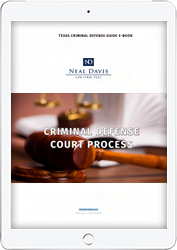
How to Appeal Your Criminal Case
What you need to know about the criminal appeals process in Texas
First, you should know that you have a legal right to appeal your case. This means that you can ask a higher court to review a lower court’s decision which went against you and to decide if that decision was fair or unfair.
To do so, you can get your criminal defense lawyer to file an appeal with the Texas Court of Appeals in the area where your case was tried. There are 14 such courts in Texas.
Texas District Courts
For the Houston area and elsewhere in Harris County, Fort Bend County and surrounding counties, that court would be the First Court of Appeals or the Fourteenth Court of Appeals. For Montgomery County, it would be the Ninth Court of Appeals.

Photo courtesy of wikipedia.org
When such courts are in highly populated areas, they are served by six justices. Elsewhere, appeals court must have at least three judges. All are elected.
If a criminal appeal goes beyond this level, it would go to the Court of Criminal Appeals of Texas. Known as the “court of last resort” for criminal appeals in Texas, it’s located in downtown Austin and has nine judges. (The Supreme Court of Texas handles civil case appeals, not criminal case appeals.)
An appeal beyond the Court of Criminal Appeals of Texas could proceed up to the United States Supreme Court, but such an appeal would have to be based on U.S. constitutional issues.
How Does a Criminal Appeal Work?
As for how a criminal appeal works, first you should know that, according to the Texas Rules of Appellate Procedure, you and your defense attorney must choose between a notice of appeal and a motion for a new trial.
Notice of Appeal
The deadline for filing a notice of appeal in Texas is within 30 days from the date of the case verdict being pronounced in open court. Usually a defense lawyer will file a notice of appeal immediately upon hearing the verdict and while still in the courtroom, rather than waiting.
After the 30 days have elapsed, you would have no right to file an appeal.
When your attorney files a notice of appeal, he or she can also file a motion for appointment of appellate counsel and attach an affidavit from you stating you are indigent and unable to pay. That would protect your right to have appointed counsel on appeal and create an option for your family or someone else to engage an attorney for you.
When the appeals process begins, your lawyer must endeavor to construct the record for the appeal.
Appeals cases don’t involve new affidavits, hearing witnesses or otherwise conducting a new trial. Rather, cases on appeal involve reviews of the case for legal errors at trial. Such reviews are done by examining the court clerk’s record and the court reporter’s record, which your defense attorney must secure. (There are some charges for copies of such transcripts).
Keep in mind that witnesses’ statements at trial may seem different on appeal. Why? A witness in person and a witness whose statements are only recorded in a written record may be perceived differently.
After these written records are filed, your attorney has 30 days to file an opening brief or a request for an extension. After your opening brief is filed, the opposing party submits a response brief, and after that, your lawyer can file a reply brief, citing points made in the response brief.
The appeals court justices will then review the briefs and the appellate record. They also may set a time for the attorneys for both sides to present oral arguments, with 20 minutes allotted for answering justices’ questions. Then, the justices will decide the case by issuing a written opinion.
A court of appeal doesn’t decide between innocence or guilt. Rather, it reviews a lower court’s verdict to see whether or not the evidence supports it. That’s called a “legal sufficiency review.”
Motion for a New Trial
On the other hand, after an unfavorable judgment at your original trial, your defense attorney could file a motion for a new trial. This must be done within 30 days of the judgment at trial. The motion for a new trial must be presented to the trial judge within 10 days after the motion is filed.
Filing a motion for a new trial extends the deadline for filing a notice of appeal from 30 days to 90 days from the date that the unfavorable judgment was given by the trial court.
By filing a motion for a new trial, your defense attorney could present a point of error in the trial, such as misconduct by a juror.
What If You Lose at Appeal?
If you lose at appeal, what then?
First, you have 15 days to file a motion for a rehearing. If that’s denied, you have 30 days to file a petition for discretionary review to the Texas Court of Criminal Appeals. This petition is restricted to 15 pages and must meticulously declare why your case is special and why it must be accepted for review beyond the lower appeals court.
If the Texas Court of Criminal Appeals in Austin denies your petition, you can go no further in the legal arena. However, if the petition is granted, the Austin court will hear oral arguments and make its own judgment in the case.
Appeals to the Federal Level
If the judgment from the Texas Court of Criminal Appeals also goes against you, you have a right to pursue a writ of certiorari in the United States Supreme Court. You can also pursue a state post conviction writ and ultimately perhaps head to federal court with a petition for a writ of habeas corpus.
Also, keep in mind that getting a federal court to overturn a state court’s decision, either in the Supreme Court or in a habeas proceeding, is very difficult. In addition, making a legal appeal at any level is a complex process for which you need a skilled and knowledgeable criminal defense attorney.
If you need an experienced criminal defense lawyer in Houston, contact the Neal Davis Law Firm for a legal review of your case.
Criminal Defense Court Process
FREE E-BOOKLearn all about the legal process and your legal rights.

